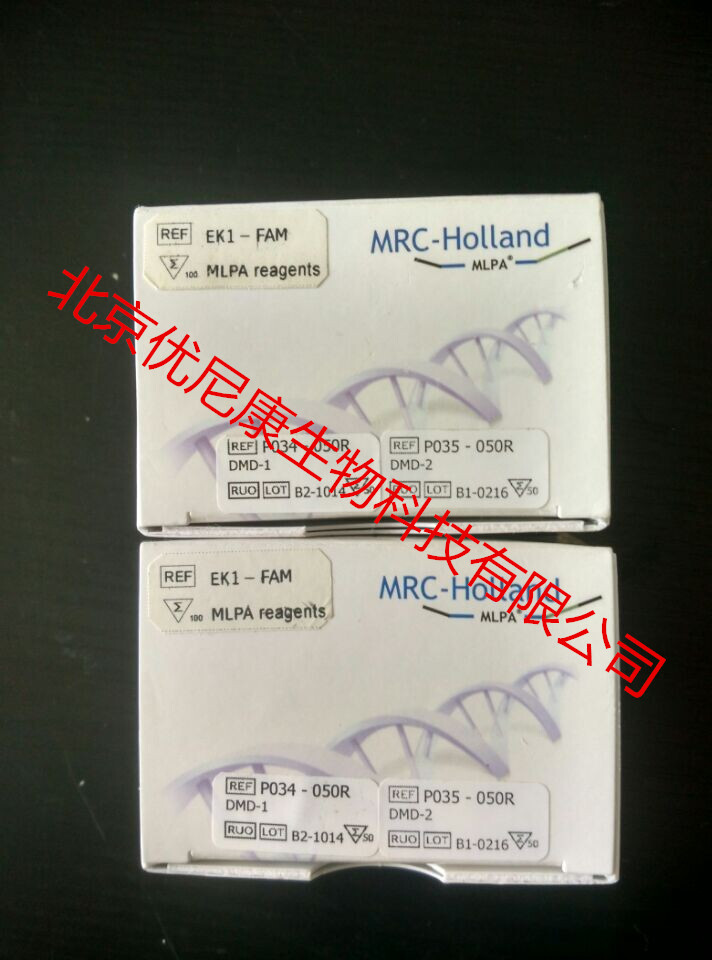- 欢迎来到北京优尼康生物科技有限公司
- |
-
商品分类

 010-64814275
010-64814275

 010-64814275
010-64814275

description
Intended use: The SALSA® MLPA® probemixes P034 DMD-1 and P035 DMD-2 are an in vitro diagnostic (IVD)1 or research use only (RUO) assay for the detection of exon deletions or duplications in the human DMD gene as a cause for Duchenne muscular dystrophy and/or Becker muscular dystrophy and for carrier screening thereof. This assay can be used with human DNA derived from peripheral blood, uncultured amniocytes, and chorionic villi.
In the majority of patients, most defects in the DMD gene are copy number variations (CNVs), but point mutations can occur which will not be detected by MLPA. It is therefore recommended to use these SALSA MLPA probemixes in combination with sequence analysis. Copy number changes detected by only a single probe always require validation by another method. These probemixes are not intended to be used as standalone assays for clinical decisions. The results of this test should be interpreted by a clinical molecular geneticist or equivalent.
1Please note that this probemix is for In Vitro Diagnostic use (IVD) in the countries specified at the end of this product description. In all other countries, the product is for Research Use Only (RUO).
Clinical background: Germline defects in the DMD gene are the most frequent cause of Duchenne muscular dystrophy (DMD) and Becker muscular dystrophy (BMD). Since both DMD and BMD are inherited in an X-linked recessive manner, it occurs almost exclusively in males. DMD usually has an early onset in childhood with delayed milestones, which include delays in sitting and standing independently. Proximal weakness causes a waddling gait and difficulty in climbing. DMD is rapidly progressive, with affected children being wheelchair dependent by the 13 year of age. Respiratory complications and cardiomyopathy occur in individuals with DMD after age of 18 and a few survive beyond the third decade. In contrast, BMD has a slower rate of progression and patients on average survive until mid-40s. More information on both conditions is available at http://www.ncbi.nlm.nih.gov/books/NBK1119/.
Deletions and duplications of complete exons in the DMD gene are the most frequent cause of disease and are usually missed by standard sequence analysis. Most of these deletions and duplications can be detected by the MLPA technique and hence MLPA complements sequence analysis of the DMD gene. The frequency of deletions/duplications in the DMD gene in DMD/BMD patients has been estimated as 60-70% for deletions and 5-10% for duplications (http://www.ncbi.nlm.nih.gov/books/NBK1119/). Best practice guidelines on molecular diagnostics in Duchenne/Becker muscular dystrophies have been published by Abbs S. et al (2010).
P034-B2 and P035-B1 DMD probemix content: The P034 and P035 probemixes contain together one probe for each of the exons of the DMD gene (79 exons) on the Xp21.2 chromosome. In addition, one probe is present in P035-B1 for the alternative exon 1 found in the transcript variant Dp427c of DMD. Performing two MLPA reactions is thus sufficient to investigate the copy number of all exons.
The P034-B2 probemix contains 49 MLPA probes with amplification products between 130 and 500 nt in length including nine reference probes. The P035-B1 probemix contains 48 MLPA probes with amplification products between 130 and 500 nt in length, eight of which are reference probes. The identity of the genes detected by the reference probes is available online (www.mlpa.com).
Each of these probemixes contains nine quality control fragments generating amplification products between 64 and 105 nt: four DNA Quantity Fragments (Q-fragments), three DNA Denaturation Fragments (D-fragments), and one chromosome X and one chromosome Y-specific fragment (Table 1). The Q-fragments are only visible with less than 100 ng sample DNA is used. Low signal of the 88 or 96 nt fragment indicates incomplete DNA denaturation. More information on how to interpret observations on these control fragments can be found in the MLPA General Protocol One-Tube.
Artificial positive control DNA sample: In case no positive DNA sample is available in your laboratory, an artificial positive duplication DNA sample (product name SD026) for this probemix can be ordered from MRC-Holland. This SD026 DNA will show a duplication of three to five probes when using the following probemixes: P034 and P035 DMD, P048 LMNA/MYOT/ZMPSTE24, P116 SGC, P176 CAPN3 and P268 DYSF. The SD026 DNA is a mixture of human female genomic DNA and a titrated amount of plasmid containing selected probe target sequences. For further details, please consult the SD026 Artificial duplication DNA product description, available online: www.mlpa.com. SD026 is for research use only (RUO).